And for decades, schools have tried to crack down on their activism.
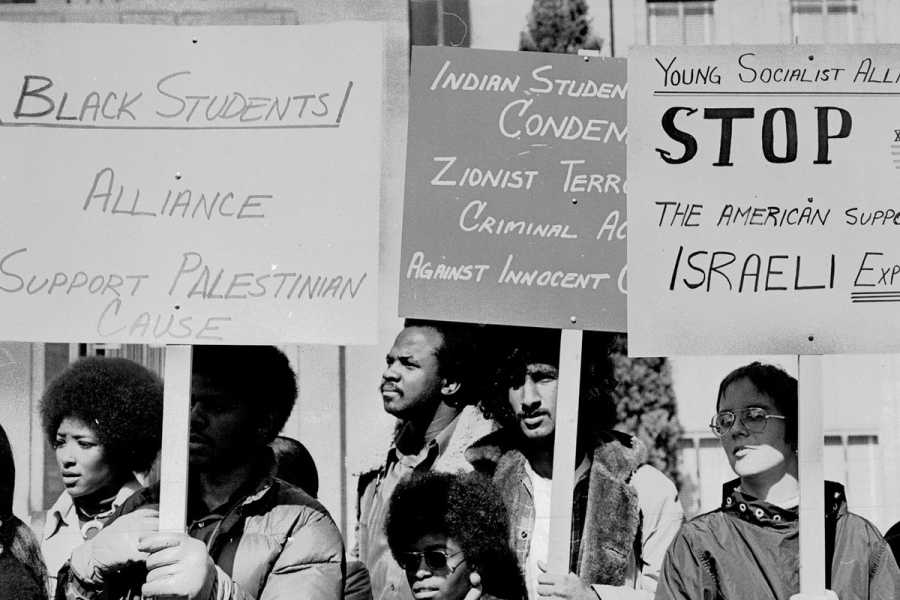
Pro-Palestine student demonstrators march from the University of Colorado campus in Boulder to show solidarity and to protest the sale of US jets to Israel in this October 1973 photo. Denver Post via Getty Images Fabiola Cineas covers race and policy as a reporter for Vox. Before that, she was an editor and writer at Philadelphia magazine, where she covered business, tech, and the local economy.
Last week, the country watched one of the biggest escalations in campus unrest this year unfold, when dozens of New York City police officers clad in riot gear entered the grounds of Columbia University and, on the orders of university president Minouche Shafik, arrested more than 108 student protesters who had built a “Gaza Solidarity Encampment” on campus. The students are calling for the school to divest from companies and organizations with ties to Israel amid the ongoing war in Gaza.
Though Shafik said at a congressional hearing she had taken the steps to make all students feel safe amid a reported rise in antisemitic rhetoric on campus, students said the administration put them in danger by authorizing a “notoriously violent” police unit to forcibly remove them, and NYPD Chief of Patrol John Chell later described the arrested students as “peaceful.”
At schools across the country, including the University of North Carolina, Ohio State University, University of Michigan, Boston University, and University of California Berkeley, students and faculty have launched marches, walkouts, and other demonstrations in solidarity with students at Columbia and to bring attention to the 34,000 Palestinians killed in Israeli attacks in the months since Hamas killed 1,200 Israelis and took more than 200 hostage on October 7.
New Haven police arrested nearly 50 people on Yale University’s campus early Monday on the third day of an encampment demonstration, while Columbia announced that classes would be held virtually as a campus “reset” and be hybrid for the remainder of the semester. Monday night, police arrested students on New York University’s campus, where about 400 people protested, after administrators called their demonstration “disorderly, disruptive and antagonizing.”
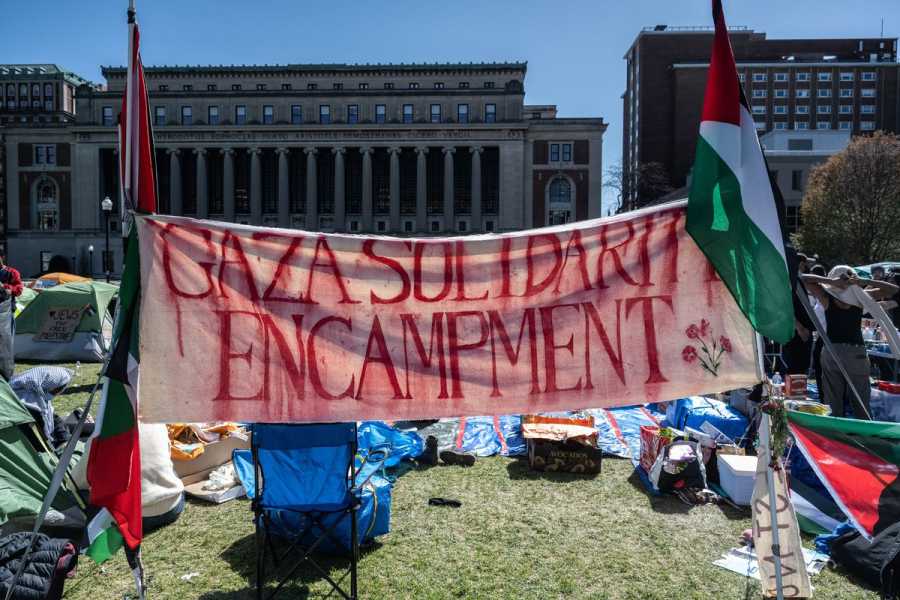
Pro-Palestinian demonstrators’ encampment at Columbia University on April 22, 2024, as the campus continued to reel after arrests of more than 100 protesters. Stephanie Keith/Bloomberg via Getty Images
These campus crackdowns have gone hand in hand with a long history of US student activism for Palestine that began even before Israel’s founding in 1948. Pro-Israel groups and students have doxxed and surveilled student activists, the media has sometimes mischaracterized their demonstrations, and administrators and law enforcement have punished the students with probations and suspensions or long legal fights and threats of jail time.
“In the current moment, we’re seeing an exacerbation of a longstanding strategy of suppression of pro-Palestine organizations on college campuses,” said Dylan Saba, a staff attorney at Palestine Legal, the organization defending pro-Palestinian students in court, last fall, as tensions on campuses were rising.
“Instead of allowing debate to take place on campuses — and allowing student organizations to highlight what’s happening to Palestinians — school leaders have taken the approach of trying to squash out the organizing and expression altogether,” he said.
Students’ pro-Palestine protest — and its suppression — has long been a locus of debate over the bounds of criticism of Israel and Zionism on campuses, the definition of antisemitism, and who is and isn’t allowed to fully exercise freedom of expression and assembly.
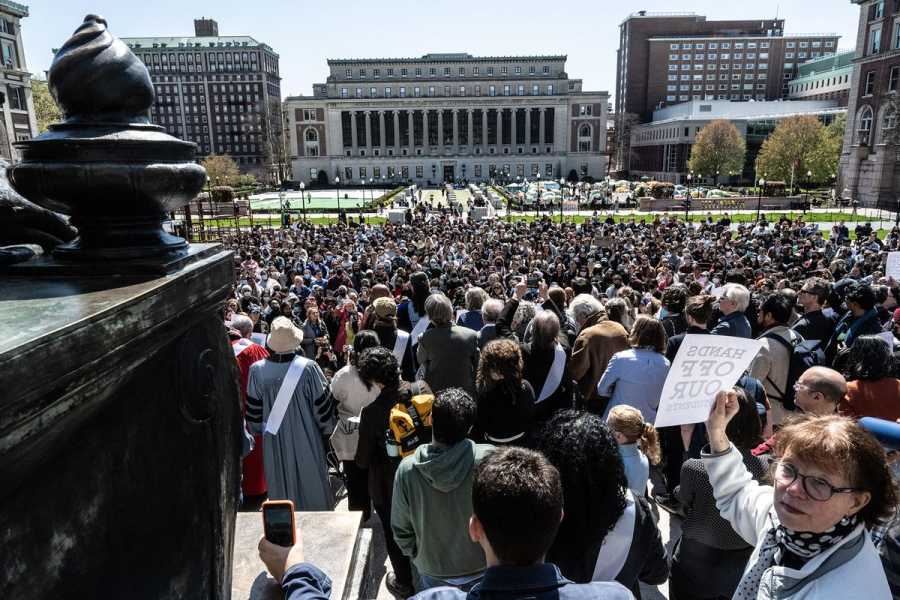
Demonstrators at Columbia University in the Morningside Heights neighborhood of New York, April 22, 2024. Stephanie Keith/Bloomberg via Getty Images
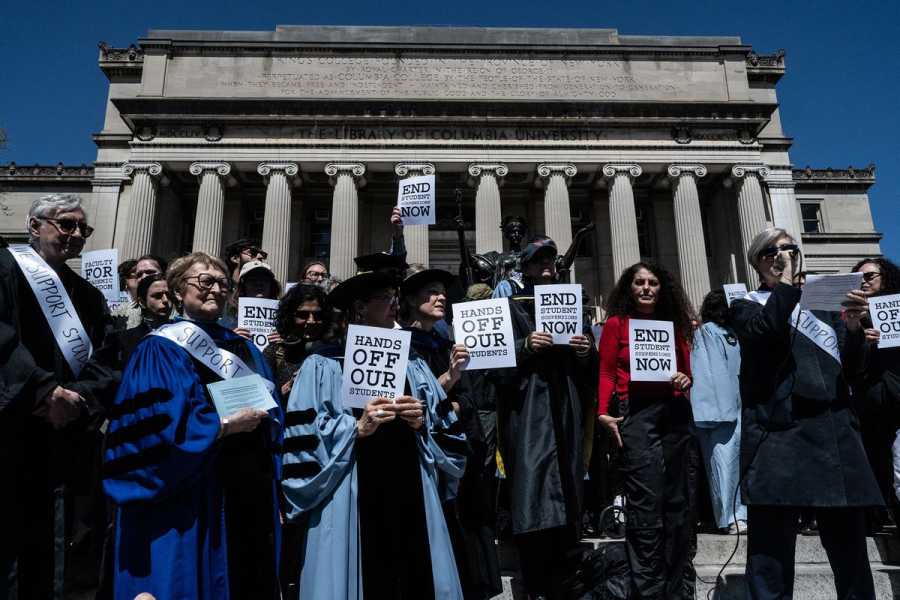
Faculty protest at Columbia University on April 22, 2024. Stephanie Keith/Bloomberg via Getty Images
The early roots of US student activism for Palestine
US student activism for Palestine predates the Nakba — the 1940s expulsion of more than 700,000 Palestinians and the destruction of villages by Zionist militias amid a war to establish the state of Israel — by decades.
Arab medical students and doctors in the US formed the Palestine Anti-Zionism Society (later known as the Palestine National League and then the Arab National League) as early as 1917 to protest the Balfour Declaration, the British government’s statement that called for the establishment of a “national home for the Jewish people’’ in Palestine.
The group published 1921’s “The Case Against Zionism” text and testified before Congress against the establishment of a Zionist state. The students also battled the negative depictions of Arabs that were spreading across the country alongside the Zionist movement.
More than 100 years ago, two members of the group told Congress what pro-Palestinian students across America are saying today: “Palestinians are not as backward as the Zionists portray them. They are entitled to a chance to build their own homeland…”
Larger-scale collective action increased as more Palestinians immigrated to the United States through the 1930s and ’40s “as the combination of colonial British rule and Zionist immigration made their lives unbearable,” San Francisco State University professor Rabab Abdulhadi wrote in “Activism and Exile: Palestinianness and the Politics of Solidarity.”
Student activism for Palestine grew with the student movement against the Vietnam War, among other struggles. Images of last week’s arrests at Columbia have even been juxtaposed with those from 1968, when about 1,000 police officers, some on horseback and carrying nightsticks, stormed the Columbia campus to arrest students protesting the war and US foreign policy.
“Palestine liberation organizing was very much a part of the anti-establishment, antiwar counterculture of the 1960s,” author and journalist Nora Barrows-Friedman wrote in the 2014 book In Our Power: U.S. Students Organize for Justice in Palestine. The 1967 war between Israel and its neighbors brought a new wave of uprooted Palestinians who couldn’t return home, students who were “politically conscious” and wanted to maintain their Palestinian identity, according to Abdulhadi.
The next few decades saw the formation of different pro-Palestinian groups, including the Organization of Arab Students, the Association of Arab American University Graduates (created by the late Palestinian American scholar Edward Said), and the General Union of Palestinian Students. Many of the organizations faded after the Oslo Accords, the American-led effort to broker peace between Israel and Palestine, in the early 1990s.
The modern face of pro-Palestinian student activism
Students for Justice in Palestine is one of the key groups currently leading protests for Palestine across US campuses. The group organized some of the encampments that have sprouted up at campuses in the last week.
Since October 7, some campus SJP chapters have been banned or suspended by administrators who say their demonstrations, slogans, and protest chants violated school policies. For example, George Washington University’s president suspended the school’s SJP chapter after students projected slogans including “Divestment from Zionist genocide now,” “Glory to our martyrs,” and “Free Palestine from the river to the sea,” on the side of the library. The president called some of the phrases antisemitic, though students and activists say the slogans call for Palestinian liberation.
SJP reignited activism for Palestine when it was launched at the University of California Berkeley in the early 1990s, as talks to dismantle the racialized apartheid regime in South Africa were underway and students drew parallels to Palestine. But it was the group’s actions amid the Second Palestinian Intifada — the uprising that began in 2000 in which Palestinians in the West Bank, Gaza, and Israel resisted the Israeli occupation — that have come to define the organization today.
At UC Berkeley, aside from organizing teach-ins and showing films to educate fellow students about Palestine, SJP members reenacted Israeli checkpoints across campus, temporarily blocking students at various campus gates. They built mock refugee camps on campus, occupied administrative buildings, disrupted classes, and chained themselves to the main administrative building.
Initially, the group “prioritized the spectacle with the aim of radicalizing our audiences and thrusting them into mobilization. The purpose was to avoid inertia,” wrote former UC Berkeley SJP member and Rutgers professor Noura Erakat in the forward to In Our Power.
But SJP found stronger direction in its divestment and “right of return” campaigns. When a vast coalition of pro-Palestine groups announced an official movement in 2005 to boycott, divest and sanction Israel, or BDS, the group at Berkeley focused on pushing for the right of Palestinian refugees to return home and the need for Israel to comply with international law.
The new platform allowed the Berkeley chapter to find broader solidarity with Palestinian organizers across the country as those groups embraced BDS. SJP grew between 2003 and 2008 as students formed new SJP chapters, expanding to the East Coast, while activity ebbed and flowed based on conditions in the West Bank and Gaza.
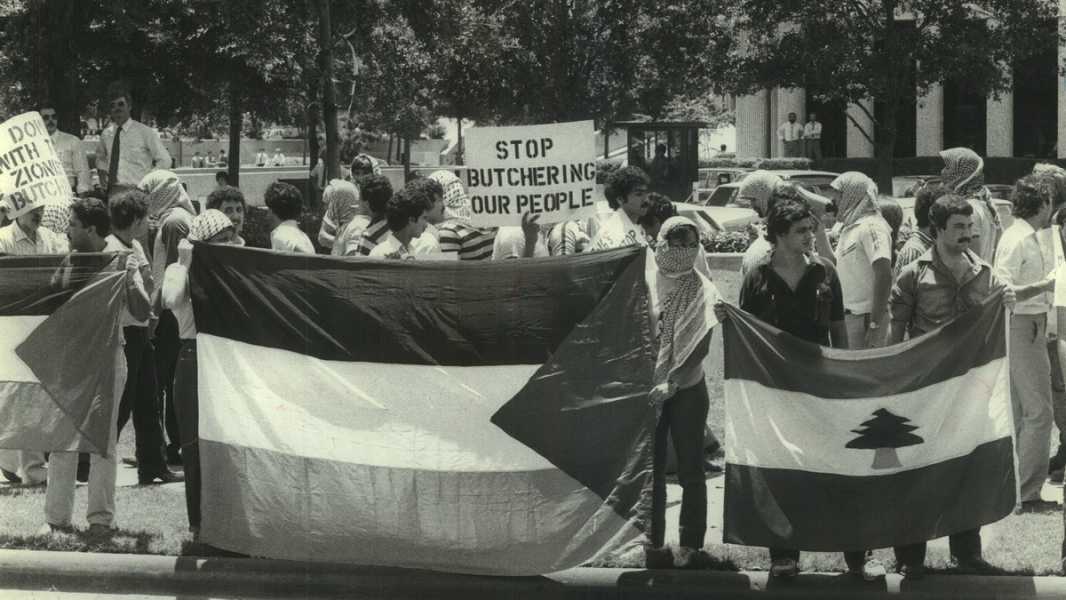
Palestinian student demonstrators gathered outside of the Israeli consulate in Houston, Texas, on July 21, 1981. Houston Chronicle via Getty Images
“Media accounts, political analysts, and most observers noted the nascent movement with interest but dismissed it as idealistic and naïve,” wrote Erakat. Members, founders, and alumni told Vox that SJP’s staying power has come from its ability to draw in students of all backgrounds, including Jewish students.
“Historically, SJP was very dynamic because of its diversity. It wasn’t a Palestinian student organization or an Arab or Muslim one,” said William Youmans, an associate professor of media and public affairs at George Washington University who helped resuscitate UC Berkeley’s SJP chapter in 2000 and started Law Students for Justice in Palestine at Berkeley’s law school. Youmans spoke with Vox last fall as protests erupted on campuses.
As SJP chapters formed, members developed new protest strategies and signature events, some of which continue today. Students at the University of Toronto, for example, launched Israel Apartheid Week to bring attention to the BDS movement, among other issues. Students told Barrows-Friedman that the week was formed to show that Israel’s occupation was not an “intractable conflict” or “of equal burden held by both Israel and the Palestinians” but an “unequal situation in which a US-supported government with an occupying military force rules over the displaced, confined, excluded, and occupied.”
When intensified violence broke out between Israel and Hamas in 2012, SJP members at UC Riverside constructed large coffins to conduct mock funerals. Around the same time, members at San Diego State University, University of New Mexico, and University of Arizona created 10-foot-tall “apartheid walls” to draw attention to the restrictions Palestinians face. Students boycotted products with connections to Israel, like the SJP members at DePaul University who organized a movement to boycott Sabra, the hummus company.
When campuses invited Israeli soldiers to deliver speeches, SJP students protested and walked out at schools including the University of Kentucky, Rutgers University, George Mason, and San Diego State University. In violation of speech and conduct regulations, some students disrupted speakers mid-speech.
Pro-Palestinian student activists have faced pushback and consequences
As students organized, they faced counterprotests from pro-Israel student groups, backlash and shifting rules from university administrators, and have been subjected to death threats, legal fights, and surveillance, doxxing and targeting by pro-Israel organizations. The crackdown on student organizing after 2000 coincided with the George W. Bush administration’s “war on terror” following the 9/11 terrorist attacks, which included the passage of the Patriot Act that made it easier for the government to carry out domestic surveillance that often targeted Muslim communities.
When SJP members at Boston University planned the school’s first Israeli Apartheid Week, BU Students for Israel formed “Israel Peace Week” and scheduled it for the week before. When students planned a Right of Return Conference there in 2013, a student reported that the conference “received a lot of pushback from Zionists who called the administration in an effort to stop the conference from happening.”
After students at Florida Atlantic University spoke out and walked out of a speech given by an Israeli soldier in 2013, they were put on administrative probation barring them from holding campus leadership positions, and forced to attend an anti-bias training created by the Anti-Defamation League, the pro-Israel organization that tracks hate crimes.
In a rare criminal prosecution, 10 students who heckled then-Israeli ambassador Michael Oren during a talk he gave in 2010 at the University of California Irvine were found guilty of misdemeanors for “disrupting a public meeting,” and were sentenced to three years of probation, 56 community service hours, and fines.
Northeastern University suspended its SJP chapter in 2014 and threatened students with expulsion after they handed out mock eviction notices during the group’s Israel Apartheid Week. That same year, university administrators at Barnard quietly removed an SJP banner with the words “Stand for Justice, Stand for Palestine” with no explanation.
When SJP passed resolutions through student governments to have their institutions stop investing in companies that support Israel, universities condemned the votes. SJP activists have reported being contacted, interviewed, or followed by the FBI over their organizing.
Individual students have also worked with pro-Israel groups on a few occasions to file claims under Title VI of the federal Civil Rights Act of 1964, alleging that SJP activism at UC’s Irvine, Berkeley, and Santa Cruz campuses created a “hostile environment,” with “harassment, intimidation, and discrimination” for Jewish students and amounted to antisemitism.
The most popular of these lawsuits, 2011’s Felber v. Regents of the University of California, was dismissed that same year after a judge determined that the university was working to foster dialogue and ensure safety between opposing groups.
Since October 7, pro-Palestinian students have struggled to strike the appropriate tone, critics said. The national SJP, which is not affiliated with any campus chapters, released a five-page instructional toolkit that called for chapters across the country to “resist” as part of Hamas’s attack, which was described as a “historic win for the Palestinian resistance.” The document, condemned as antisemitic, featured paraglider imagery in its graphics, reminiscent of the Hamas militants who descended on Israel during the attack. The state university system of Florida swiftly deactivated its SJP chapters after the toolkit’s release, arguing that the students were providing material support for a terrorist organization.
“October 7 was a unique moment because the scale of Hamas’ attack is unprecedented in Palestinian history. The scale of the atrocity, the spectacle of violence against civilians — it was a horrific attack,” said Youmans. “That put a lot of student organizers in this complicated position. On the one hand, the US media was focusing on the horror of it and a lot of Palestinian solidarity activists were saying that it was the natural outcome of constant bombardment of Palestine by Israel every two to three years for a decade and a half. There was this violence and traumatization that was happening for years.
“But instead of explaining that, a lot of SJP chapters used slogans or others had a celebratory tone. It was so out of touch with the larger mood in the country.”
Student organizers who spoke to Vox said that they denounce antisemitism and take time to welcome their Jewish peers at protests. At the Columbia encampment last week, students held Shabbat and sang prayers, and for the first night of Passover on Monday, students held a seder at the tents. But other Jewish students have reported feeling unsafe.
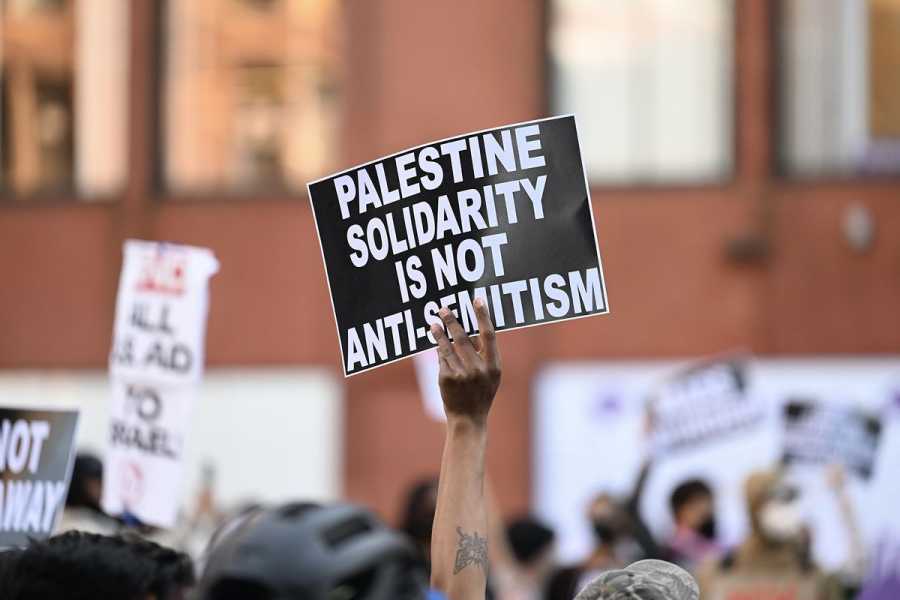
Students at New York University continue their demonstration on campus in solidarity with the students at Columbia University and to oppose Israel’s attacks on Gaza, on April 22, 2024. Fatih Aktas/Anadolu via Getty Images
The focus on their protest strategies, their mistakes, and the discipline they’re facing, student organizers told Vox, only detract from the reality that Israel has killed 34,000 Palestinians and has destroyed nearly 70 percent of homes in Gaza.
“There’s a respectability politics that we are forced to constantly hold ourselves to, not just as an organization, but also as students who are Arab American, or Muslim, or Palestinian on campus,” said a George Washington student who spoke to Vox last fall on the condition of anonymity because they fear for their safety, including fears that their personal information could be posted online without their permission. “We have to play into this idea of a respectful Arab who uses demure language and [act] like liberation is not at the forefront of our demands. It’s just a way to suppress the movement. The conflation with antisemitism is aggressive.”
As students approach finals season, with commencement ceremonies on the horizon, many across the country, supported by some faculty members and alumni, say they won’t stop protesting until their demands are met. “Cracking down on student protesters has only made us louder,” Columbia SJP wrote in an Instagram story. “We will not be silence[d] until Columbia divests from genocide & palestine is free.”
Sourse: vox.com